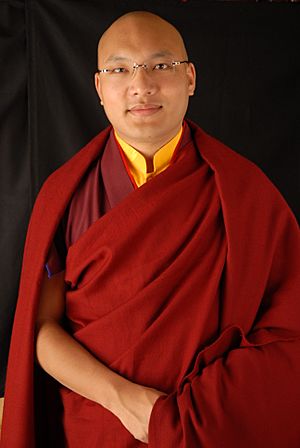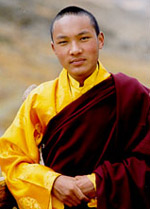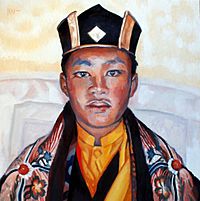Ogyen Trinley Dorje facts for kids
Quick facts for kids Ogyen Trinley Dorje |
|
|---|---|
 |
|
| Religion | Tibetan Buddhism |
| Denomination | Vajrayana |
| School | Karma Kagyu a.k.a. Kamsang Kagyu |
| Lineage | Karma Kagyu |
| Dharma names | Ogyen Drodul Trinley Dorje |
| Personal | |
| Born | Apo Gaga (Happy Brother) 19 June 1985 Chamdo County, Tibet, China |
| Senior posting | |
| Title | His Holiness 17th Karmapa Co-claimant along with Thaye Dorje |
| Predecessor | Rangjung Rigpe Dorje |
| Religious career | |
| Reincarnation | KarmapaCo-claimant along with Trinley Thaye Dorje |
Ogyen Trinley Dorje (born June 26, 1985) is a very important figure in Tibetan Buddhism. He is known as a claimant to the title of the 17th Karmapa.
The Karmapa is the leader of the Karma Kagyu school. This is one of the four main schools of Tibetan Buddhism. Ogyen Trinley Dorje is one of two people recognized as the 17th Karmapa. The other is Thaye Dorje.
Contents
Who is Ogyen Trinley Dorje?
Ogyen Trinley Dorje was born with the name Apo Gaga. He was born in 1985 in a part of Tibet called Lhatok Township. His parents were nomads, people who move from place to place with their animals.
In 1992, the 14th Dalai Lama, another important Buddhist leader, officially recognized him. He said that Ogyen Trinley Dorje was the reincarnation of the 16th Karmapa. Reincarnation is the belief that a person's spirit is reborn in a new body after death.
He was officially welcomed as the 17th Karmapa at Tsurphu Monastery in Tibet. This is the traditional home of the Karmapas. There, he started his education in Buddhist teachings. The Chinese government also officially recognized him as a "living Buddha," which is a special title for a respected teacher.
A Daring Escape from Tibet
When he was 14 years old, Ogyen Trinley Dorje made a brave decision. In the winter of 1999, he escaped from Tibet, which was under Chinese control. He traveled through the mountains to India. He arrived on January 5, 2000.
He said he left because he couldn't get the special training he needed in Tibet. This training was important for him to become a strong spiritual leader. After arriving in India, he lived at the Gyuto Monastery near Dharamshala for many years.
Traveling the World
In 2008, Ogyen Trinley Dorje made his first trip to the United States. He visited cities like New York City and Seattle. He taught people about important ideas like compassion and caring for the environment. He also talked about how to use the internet to learn about Buddhism.
Since then, he has visited the United States again. He has also traveled to countries in Europe, including France, Switzerland, and the United Kingdom.
In 2018, to make traveling easier, he became a citizen of Dominica, a country in the Caribbean. He has been living mainly in the United States since 2017.
Important Work and Teachings
Ogyen Trinley Dorje works on many projects to help people and preserve his culture.
Protecting Tibetan Culture
He believes it is very important to protect Tibetan culture and language. He says the language is the root of Tibetan spirituality and art. He wants to make sure that Tibetans can continue to speak and write their language.
To help with this, he started projects to make Buddhist texts available online. This means people all over the world can read important scriptures and teachings. He also started a project called "108 Translations." This project translates books into Tibetan that are easy for everyone to read.
Supporting Women in Buddhism
Ogyen Trinley Dorje works to make sure women in the Buddhist community have equal rights. He is especially focused on helping nuns. He wants to restore full ordination for them, which is a special ceremony that gives them a higher status.
A Call for Vegetarianism
In 2007, Ogyen Trinley Dorje asked all of his monasteries and centers to serve only vegetarian food. He also encouraged his followers to stop eating meat. He believes that in the Mahayana tradition of Buddhism, it is very important not to eat meat.
Protecting the Environment
Ogyen Trinley Dorje is a strong voice for protecting our planet. He has spoken about the importance of caring for the environment.
He once said that planting a single tree can be more helpful than some older traditions. He encouraged monasteries to plant thousands of trees. On Earth Day in 2009, he shared 108 tips on how to protect the environment.
He also helped create Khoryug. This is a group of Tibetan Buddhist monasteries that work to protect the Eastern Himalayas. He believes that the environmental problems we face are a moral issue. He says everyone has a responsibility to help find solutions.
See also
 In Spanish: Ogyen Trinley Dorje para niños
In Spanish: Ogyen Trinley Dorje para niños
- Karmapa controversy
- Kagyu
- James Parks Morton Interfaith Award
 | Emma Amos |
 | Edward Mitchell Bannister |
 | Larry D. Alexander |
 | Ernie Barnes |



